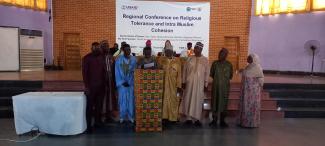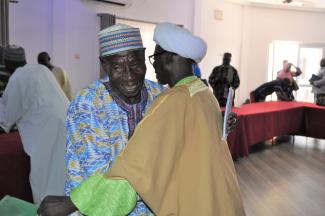“I was born in Tamale and throughout my life, I have never witnessed what I am seeing today. Religious leaders from Shia, Sunni, Tijania, and Ahmadiyya denominations coming together to foster religious unity is truly remarkable,” said Professor Amin Alhassan, the Director General of the Ghana Broadcasting Corporation, expressing profound joy at the unity and improved community relations he was witnessing in Northern Ghana.
Alhassan is referring to the decades-long history of violence between Sunni Muslim groups in Tamale, Northern Region of Ghana. Rooted in religious differences, diverse views on scripture, and competition over influence and power, the conflicts divide communities. They also open doors for Violent Extremist Organizations (VEOs) to infiltrate and pose a significant threat to the peace and stability of the region.
A study conducted by USAID’s Office of Transition Initiatives Littorals Regional Initiative (OTI/LRI) revealed that clashes between different Muslim denominations were often fueled by inflammatory preaching by religious leaders on radio broadcasts and on social media. Lack of content moderation by radio stations, who often open their airwaves to the highest bidder, often compounds the issue.
OTI partnered with the Northern Regional Peace Council (NRPC) — a quasi-governmental entity with a mandate to foster sustainable peace in Northern Ghana — to train local leaders and community members on conflict mediation techniques, religious tolerance, coexistence, and preventing violent extremism. Bringing together religious leaders, media professionals, radio station managers, and civil society representatives, the initiative equipped participants with the knowledge and tools necessary to address factors contributing to community tensions.
After the training, religious leaders began organizing monthly dialogues to exchange ideas and promote responsible messaging on religious issues among media practitioners. They also established an Interfaith and Response Group to encourage religious leaders to engage in constructive dialogue on intra-Muslim issues. These leaders continue to meet today and have even established a Memorandum of Understanding between religious leaders and media professionals, aimed at developing a code of ethics and enabling media professionals to conduct content moderation on the airwaves. Media managers and actors also play a crucial role in preventing conflict by monitoring and editing the speeches of religious leaders on their airwaves.
In December 2022, in response to the success of the NRPC and OTI-led dialogues, a 29-member Northern Regional Muslim Council was established in Tamale to serve as a unifying umbrella for all Muslim denominations in Ghana. One year later, the NRPC successfully organized a close-out regional conference, bringing together more than 250 participants including faith leaders from across Muslim denominations, civil society organizations, youth leaders, and political party representatives.
"We have seen a reduction in religious animosity and insults among scholars since these engagements started, and we continue to plead with religious leaders to maintain the region's peace. Religious leaders must work to sanitize social media, which is a serious concern lately; and to preach for peace in the upcoming national elections." - the Regional Minister's Representative
These efforts have strengthened interfaith dialogue, increased understanding of the violent extremist threat, and fostered peaceful resolution to conflicts. During the regional conference, leaders emphasized the importance of diversity and harmony and urged Islamic preachers to practice what they preach, translating peaceful teachings into impactful actions. This is a testament to the power of dialogue, collaboration, and commitment to preventing violent extremism and serves as a powerful blueprint for communities grappling with similar challenges.



